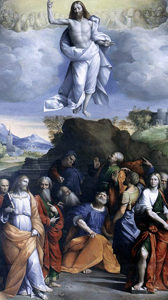Scripture:
Acts 1:1-11
Ephesians 1:17-23 or
Hebrews 9:24-28; 10:19-23
Luke 24:46-53
Reflection:
Traditionally, this day has been the day the Church celebrates the Solemnity of the Ascension of our Lord. In many dioceses, this solemnity has been moved to the upcoming Sunday for greater participation. As we have journeyed through this Easter Season, I’ve grown in an appreciation for what the Apostles and early believers had to deal with in their desire to spread the news of the risen Christ. The days of the Early Church were filled with opposition and discord. And the disagreements weren’t always with the unbelievers. Last Sunday, for example we heard how “no little dissension” between the new Jewish believers and the Gentile believers led to assembling the leaders and elders of the Church in Jerusalem. This was the Church’s first Council—the Council of Jerusalem. And I had to ask why Luke chose to include this in his book, the Acts of the Apostles. Truthfully, I’ve grown in an appreciation of how Luke will include both the success stories and the stories of struggle and frustration.
Numerous times the Church will end the Easter reading from Acts on a very positive note, telling us how many people came into the faith. In previous years I’ve dwelt more on the positive ending of the story almost negating the difficulties and frustrations Paul must have had to absorb. Today’s first reading is yet another in the collection of frustration and rewarding experiences for Paul and the early believers. Allow me to highlight a few points.
- He is coming from Athens, where things didn’t go as he had planned. The great Greek philosophers of Athens laughed at him and “scoffed” him. He finds solace with some fellow tentmakers in Corinth named Priscilla and Aquila, who will both become good friends of Paul.
- His trips to the synagogue were numerous. When Silas and Timothy join him it is no longer merely his word or the testimony of his experience. He now has the support, encouragement and voices of others who have also had the experience of the risen Christ.
- I’ve often wondered about Paul’s home life. Why would he leave family behind to spend his life telling people about Jesus? At what point do the frustrations and disappointments build up so high that he would just quit and tell himself that his family and friends are more important? Yet Paul uses the word “responsibility” in today’s first reading. He sees it his responsibility to bring the message of Jesus to those of his own religious persuasion.
- Luke specifically mentions Titus and Crispus, along with Crispus’ household and adds “many” others came to believe and were baptized. Yet realistically there were those (many) who didn’t believe and probably many who didn’t care one way or the other. Is this any different than the dynamics we face in Christian churches throughout our country?
Paul’s ability to keep things in perspective must have been a real gift. He most likely found regular encouragement through his journeys, keeping fervent his passion for proclaiming Christ. We all know those continuous, even daily experiences of opposition wear away at us. The zeal Paul had emerging from his conversion experience would not have sustained him through his three significant missionary journeys. Yet the work of these journeys set a foundation for this new group of believers to build on; even to this day, including you and me.
Fr. David Colhour, C.P. is the pastor of St. Agnes Parish in Louisville, Kentucky.

